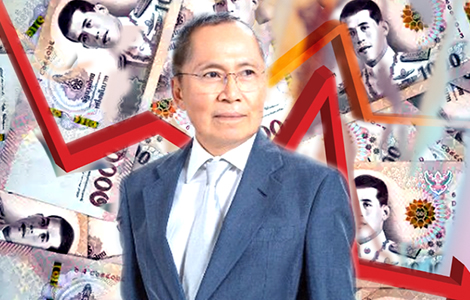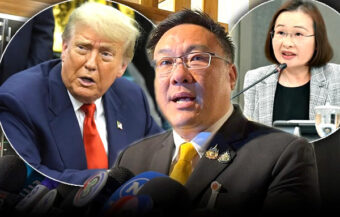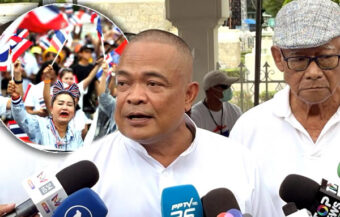Srettha’s policies under scrutiny as former Deputy Prime Minister Kobsak Sabhavasu questions the efficacy of the Digital Wallet scheme and warns against the proposed civil servant salary increase. Sabhavasu emphasises the looming risks of a genuine economic crisis driven by escalating public and private sector debt, coupled with potential inflation.
A former deputy Prime Minister in the 2008 to 2011 government of Prime Minister Abhisit Vejjajiva this week warned that the expansionist policies of the current Srettha Thavisin government in the face of counter realities risks driving the kingdom into a genuine economic crisis, that may not be so easy to tackle.

In a candid analysis in the last few days, former Deputy Prime Minister Kobsak Sabhavasu, a key player in the 2008 to 2011 government of Prime Minister Abhisit Vejjajiva assessed Thailand’s economic landscape, focusing on the controversial digital wallet wealth distribution measure and the proposal to increase civil servants’ salaries by 18% in 2024.
As Prime Minister Srettha Thavisin’s government grapples with these initiatives, concern has risen about the country’s level of public debt which has risen steadily from an average of 45% between 1996 to 2022 to a current level of 61.25% after the last government increased the cap on borrowing from 60% to 70% under the 2018 State Fiscal and Financial Disciplines Act.
Thailand’s new government is seeking growth in the economy that may not be possible due to chronic problems and a challenged external environment
This figure is thought likely to rise with the present government’s pro-growth agenda.
The Pheu Thai government appears to be pursuing the economic agenda outlined by the Pheu Thai Party in the run-up to the May 14th General Election which is predicated on achieving 5% growth per annum.
Thailand last saw growth above 5% eleven years ago in 2012 when the economy expanded by 7.2%. The economy contracted by 6.1% in 2020 and only expanded by 1.59% in 2021 and 2.59% in 2022. This year it will be lucky to see 2.4% growth.
PM ‘worried’ over shock GDP data showing the economy stalling with only 2.5% growth projected
The former deputy prime minister, a member of the Democrat Party until 2019 and then with the Kla Party where he worked with former Minister of Finance Korn Chatikavanij, like others, has also raised concerns about potential inflation.
Warning about a real crisis driven by debt and inflation if the government doesn’t rein in ill-conceived expansionary spending plans
Mr Kobsak makes it clear that the risk of triggering a real crisis looms large, driven by higher public sector debt, an impossible level of private sector borrowing levels combined at some point with rising or even runaway inflation if the government has its way.
Ironically, this warning comes as the government, to pass its Digital Wallet measure by decree in parliament, is insisting on portraying the Thai economy as currently in crisis, something strongly refuted by Move Forward Party economic spokesperson Ms Sirikanya Tansakul in recent weeks.
However, what does confront the government are chronic problems such as still rising household debt and an ageing workforce as well as a troubled external economy where tensions have risen since 2017 in addition to a severe downturn in China’s economic prospects.
Current economy: former Deputy Prime Minister notes that it is neither a crisis nor recession but the threat of a real crisis looms very large right now
Kobsak begins by challenging the government’s assertion of an ongoing economic crisis, citing experts who argue that Thailand’s economic situation doesn’t yet warrant such a label. He questions the government’s unique stance on crisis management, emphasising the importance of accurate economic metrics.
Contrasting the present situation with the Abhisit government era, Kobsak points out that while the current economy maintains positive growth, concerns arise from the staggering national debt, drawing parallels to past economic crises.
He stresses the need for targeted economic stimuli and criticises the absence of a comprehensive economic package by the current administration.
Digital money distribution plan is an economically flawed solution says ex-minister while political pundits say it will collapse Srettha’s government
Kobsak critically examines the government’s digital wallet policy, deeming it an inadequate solution to the country’s economic challenges. He underscores the necessity of borrowing to fund this ambitious project, expressing scepticism about its efficacy in addressing the core issues at hand.
Srettha outlines Digital Wallet as his government begins to flounder with a faltering economy and confusion
Digital Wallet plan could break up the government before it launches says top Thai political pundit
The former Deputy Prime Minister raises practical concerns, questioning the viability of small businesses accepting what is effectively a digital coin or token and the potential disruption to international trade balances. He warns that a surge of digital money into the system could lead to a shortage of goods and an inevitable rise in prices, exacerbating negative budgetary implications.
Political problems also arise with the plan
He noted that small business concerns are likely to shun the initiative with difficulty getting paid to be the great turn-off while larger concerns may chance it.
He also noted that the products that can be sold are more likely to be imported goods and this coming at a time when exports are still in a slump cannot be good for the country’s balance of payments.
Not to mention the political dangers with lukewarm support currently coming from coalition partners for the scheme such as the Bhumjaithai Party with top political pundits predicting the measure, which has yet to be reviewed by the Council of State, could collapse Srettha’s government.
Civil servant salary increase of 18% just announced is just a recipe for inflation says Mr Kobsak who also questions the accuracy of Thai economic data
Kobsak, who is a Stanford graduate, delves into the proposal to increase civil servant salaries by 18% agreed recently by the cabinet, drawing parallels to the distribution of money in the United States during the pandemic.
He highlights the risk of inflation if such policies result in an excess of money circulating in the economy. Drawing from historical examples, he warns of the consequences of mismanaging economic stimuli, advocating for cautious consideration of inflationary pressures.
The former Deputy Prime Minister draws attention to the delicate balancing act required to navigate these economic initiatives successfully.
He cautions against rushing into policies without comprehensive planning, emphasising the potential long-term ramifications on the country’s fiscal health.
Former Deputy Prime Minister and PM Secretary-general underscores the need for a balanced budget and warns that it is a discipline being forgotten about
Expressing deep concern about Thailand’s fiscal situation, Kobsak reflects on the absence of a balanced budget since the era of General Chatchai Choonhavan, the 17th Prime Minister from 1988 to 1991.
He questions the wisdom of accumulating debt without a clear plan for its utilisation and the lack of measures proposed by the opposition to address these economic challenges.
In conclusion, Kobsak Sabhavasu calls for a more thoughtful and strategic approach to economic management. He advocates for transparent solutions, highlighting the critical need for a balanced budget and a comprehensive economic package to steer Thailand away from potential crises.
As the nation stands at a crossroads, the decisions made in the coming months will undoubtedly shape its economic trajectory for years to come.
Join the Thai News forum, follow Thai Examiner on Facebook here
Receive all our stories as they come out on Telegram here
Follow Thai Examiner here
Further reading:
Fragile, weak economy sees central bank holding interest rates and reducing 2023 growth to 2.4%
Srettha’s crisis is not just an economic one, it is a ‘3D debt crisis’ that is strangling GDP growth
Zombie Thai firms holding back economic growth as they struggle just to pay interest on bank debt
Incoherent government economic policy clashes with Bank of Thailand’s efforts to rein in debt
Economy is in troubled waters with fears for both exports and foreign tourism as 2023 winds down
Thailand faces an economic future of low growth despite Srettha’s plans because of a darker world
Another dip for the baht or are economic danger signals flashing for both Thailand and the world?
Police chief confirms 2 dead with reports of at least one more fatality in Bangkok mass shooting
Bank of Thailand boss appears critical of the new government’s policy initiatives on the economy
Concerns over household debt rising as banks report marginally lower non-performing loans
Thailand preparing for a soft landing as ‘cracks’ open up in the Chinese economy says bank chief


















